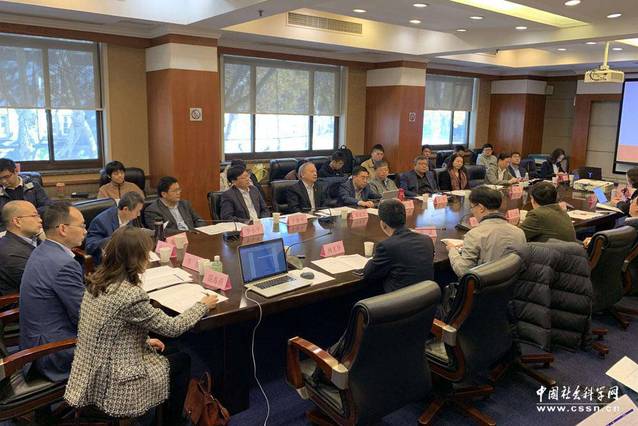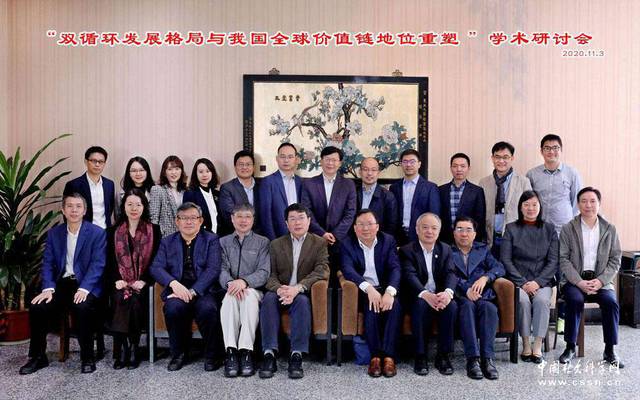
At the meeting
From November 2nd to 4th, the seminar “Double Circulation Development Pattern and Reshaping China's Position in the Global Value Chain”, mainly hosted by the School of Economics and Management of Southeast University and organized by the Institute for International Economics of Southeast University and the Economic Globalization Research Center in Jiangsu province, was successfully held in Southeast University. More than 30 experts and researchers in the field of international trade came for discussion and communication.
Xu Zhishun, the Vice President of Jiangsu’s Federation of Social Sciences, Ren Lijian, the Deputy Party Secretary of Southeast University, and Yuan Jianhong, the Party Secretary of the School of Economics and Management of Southeast University attended the opening ceremony and gave speeches. Qiu Bin, the Distinguished Professor and President of the Institute for International Economics of Southeast University hosted the opening ceremony.
In the keynote speech stage, experts from China-Europe International Business School, Tsinghua University, Beijing Normal University, University of International Business and Economics, Nankai University, Fudan University, Shanghai University of Finance and Economics, Shanghai University of International Business and Economics, Sun Yat-sen University, Zhongnan University of Economics and Law, Hunan University, Anhui University of Finance and Economics, Nanjing University, Southeast University, Nanjing Agricultural University, Nanjing University of Finance & Economics, and other institutes delivered their speeches on a wide range of topics. The keynotes mainly were: 1) the background of the double circulation development pattern and the effect it has on China’s macroeconomy; 2) the promotive interaction of internal and external circulation and China’s international trade strategy; 3) the changes in China’s strategy of attracting foreign capital under double circulation circumstances; 4) the developing trend of the global value chain in COVID-19 epidemic times; 5) measurement of the global value chain and others.
In the report named The Analysis of the Internal-Focused Double Circulation and Exploration of Future Theories about International Trade, Xu Bin, a professor at China-Europe International Business School, indicated that China was presently in a double transformation period, with the supply side changing from quantity-based to quality-based and the demand side changing from external-focused circulation to internal-focused circulation. As we were constructing a new development pattern with the domestic large circulation being the main body and domestic and international circulation promoting each other, domestic demand was the core of the internal circulation leading mode, and its potential was closely related to people’s propensity to consume, income gap, and disposable income level. We should further enhance the equity of residents' income and the per capita disposable personal income to enlarge domestic needs.
The key point in dredging domestic large circulation is reforming the factor market and perfecting the market economy system, promoting domestic and international circulation needs to complete the industry chain and elevate its position in the value chain. Chen Shiyi, a professor at the School of Economics of Fudan University, pointed out that the factor market reforming is the internal need of constructing a unified domestic market and the reassurance to enterprises’ vigor, which can promote market confidence, accelerate economic recovery, and let the government play its role better. We should develop domestic trade based on the large domestic diversified market, use our trade advantage in Asia to push forward the construction of the Asia Free-Trade Area and further development of service trade.
Sheng Bin, a professor at the School of Economics of Nankai University, indicated that the essential points were constructing the double circulation development pattern, increasing domestic demand, structurally reforming the supply side, matching the supply and demand system, and further opening up internationally. As for political measures, we should enhance the economic double circulation, push forward high-quality development, high-level opening-up, market opening-up, and institution opening-up, construct the global value chain system and develop the domestic value chain system, use domestic demand as the leading role and stabilize foreign demand, break foreign barriers and intergrade domestic market, construct “One Belt, One Road”, develop domestic regions, replace import and upgrade export, attract foreign capital and invest internationally, organize high-level factors and spaces, and effectively combine independent innovation and international research cooperation.
Zhu Jing, a professor at the School of Economics and Management of Nanjing Agricultural University, pointed out that food safety is crucial in our policy goal of becoming a powerful nation. The strategy for our country’s food safety is domestic-based, productivity-assured, import-regulated, and technology-supported. In order to construct a new double circulation development pattern, we should push forward with a high-level opening up. As our nation’s food safety steps into a new stage under a high-level opening-up, we should create an internal basis under external uncertainties, which mainly are: 1) weaken productivity-orientation; 2) strengthen competition-orientation; 3) perfect system design; 4) push forward trade negotiations; 5) use multi-source import strategy to regulate foreign risks; 6) enhance demand side management to reduce waste.
Since joining WTO, our country has been intensifying reform and opening wider to the outside world, promoting the tariff system reform and reducing tariffs as the reform went on. Our country had decreased tariffs on consumer goods several times since 2017. Did the opening up policy dramatically reduce the cost of residents’ expenditure and raise personal welfare? Ma Hong, a professor at the School of Economics and Management of Tsinghua University, indicated that empirical studies had found that full-scale opening up and reducing tariffs had: 1) dramatically reduced our country’s import prices of consumer goods; 2) boosted an increase in the quantity and types of imported goods; 3) effectively reduced prices of domestic consumer goods of the same type using procompetitive effects and raised people’s consumption and welfare level. Because of all the above, further opening up is beneficial to increasing domestic demand and promoting internal circulation.
Huang Jianzhong, a professor at the School of International Business of Shanghai University of International Business and Economics, implied that a structural and unsteady strategic environment and new development chances were worthy to be noted. He advised that we should imply the structural strategy: while using domestic circulation as the main body, we should reorganize the base environment into “domestic-oriented industry chain, foreign-oriented supply chain, producer-oriented industry chain, and consumer-oriented supply chain”. In the promoting relation between domestic and international circulation, the demand side focused on stabilizing the position in the Asian-Pacific production network, and the supply side focused on enhancing the supporting effect of “One Belt, One Road” construction points. As the service industry continues to gain a larger part of our GDP, opening up the service industry and liberalization of service trade have become the fields that are the most needed, most practicable, and easiest to achieve in structural reform.
We should shape an international competitive advantage in the restructuring of the value chain. Zhang Yabin, a professor at Hunan University, believed that in the construction of a new double circulation development pattern, it was necessary to enrich and improve the global value chain and regional value chain. We should deepen the domestic division of labor, give full play to the economic advantages of a big country, strengthen and focus on the internal circulation, deepening the external circulation in the mean time, and realize the mutual promotion of the internal and external circulation. The core of the reconstruction of the global value chain and the construction of a new double circulation development pattern is based on our country's economic advantages as a big country. By deepening the domestic division of labor, we would partially replace the international division of labor. By strengthening the domestic division of labor, we would seek to expand the international division of labor. By activating the large domestic market, we would not only activate the final product market, but also the intermediate product market; full-scale opening up not only includes the commodity market, but also the more important factor market.
Li Xiaoping, a professor at the School of Economics of Zhongnan University of Economics and Law, analyzed the changes and its driving mechanism in the domestic value-added rate (DVAR) of China's manufacturing exports from the perspective of double circulation. He said that the domestic value-added rate (DVAR) of China's manufacturing exports had a long way to go. Compared with external circulation, domestic circulation had a more significant impact on the change of the domestic value-added rate (DVAR). China's manufacturing industry should fully seize the opportunity to build a new double circulation development pattern, get rid of the low-end trap, and achieve value growth.
Huang Xinfei, a professor at the School of International Finance, Sun Yat-sen University, said that innovation was an important source of economic growth. Under the background of "stabilizing foreign trade and foreign investment" and building a new double circulation development pattern, enterprises should pay attention to the improvement of their innovation level and form core competition through innovation. We must resist the risks of de-globalization and adapt to the new pattern and situation as soon as possible.
Lv Yue, a professor at the School of International Business and Economics at the University of International Business and Economics, believed that global value chain embedding has the effect of inhibiting product scope, and passively integrating into the global value chain dominated by multinational companies from developed countries may be constrained, such as falling into "product lock-in". Chinese enterprises should more actively integrate into the division of labor system of the global value chain, actively participate in international economic and trade governance, and realize the upgrading of the diversity of manufacturing products by improving enterprises’ market competitiveness and absorptive capacity. At the same time, we should continue to improve the quality of foreign investment and optimize the structure and layout of foreign investment.
The global procurement of intermediate products for enterprises is an important manifestation of China's participation in the global value chain. The imported intermediate products are processed and then exported, which has become our country's main foreign trade model. Zhang Liang, who was from the School of Economics and Management of Southeast University, pointed out that empirical analysis proved global procurement of intermediate goods has a significant welfare effect on China's manufacturing industry and overall economic development. At the level of policy measures, the welfare effect of global procurement of intermediate products should be reviewed from a strategic level, and the measures of “proactively expanding imports” should be actively implemented; while expanding the import of advanced technology equipment and key components, the loan support for imported technology and equipment should be increased. A good industrial environment is conducive to the spread and exertion of welfare effects, and the inherent laws of industrial evolution should be followed to improve the resilience of the domestic production network.

The joint photo of participating experts
Source: Chinese Social Sciences Net
Translated by: Li Zhaoting
Reviewed by: Wang Xuanyu

